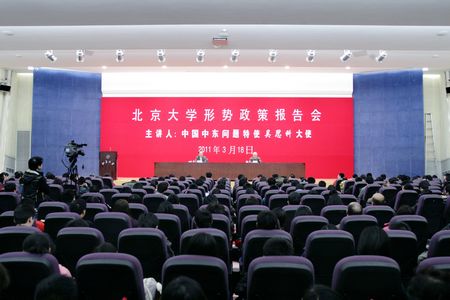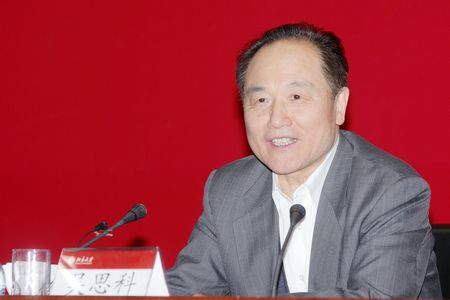Peking University, Mar. 22, 2011: China's Middle East envoy Wu Sike attended a lecture (specialized for the contemporary situation and policies) in Qiulin Lecture Hall of Peking University (PKU) on the afternoon of March 18, 2011, during which he analyzed and expounded the situation problems existing in Middle East. PKU Council Vice Chairman Yang He presided over the lecture.

First, Wu Sike introduced the condition in Tunisia. Tunisia is a Mediterranean country with beautiful scenery, whose pillar industry is tourism. In the past few years, Tunisia has stayed steady and prosperous. In its national liberation movement, soldiers rose up, ended the colonial domination, and established republicanism, which made a widespread influence to the other Arab countries at that time. However, the military domination has been gradually inclined to a hereditary system ever since. “The ossification and exclusiveness of politics disable military domination in activating the vitality of society,” said Wu Sike.
The situation in Egypt is similar, where the politics is rigid. Some distinguished families are controlling the political power and the major part of properties, while common people are living a hard life. Wu Sike talked about his own experiences in activities held by some distinguished families, which left on him the impression that they were even richer than a country. Before the coup happening recently, the Egyptian government, on one hand, tried to ensure its people’s basic living, and, popularized Islamism and spread the thought of taking order on the other hand to guarantee the stability of the society. However, with the increasing portion of highly educated youth in Arab countries, dissatisfaction accumulated day by day, and there have been a demand for revolution among people which was finally put forward by a political group called Muslim Brotherhood. And Hosni Mubarak’s scheme action for his son’s succession in his position acted as the igniter cord.

Wu Sike also pointed out some external factors resulting in the coups in the Middle East. The political factor is that after the radical social changes in the Soviet Union and Eastern Europe, Arabdom was faced with pressure from the Western World requiring its economic freedom, independence and democracy. The economic factor is that the revolution wasn’t radical enough, and the economic sectors were unitary and dependent. The financial crisis produced tremendous losses in Middle East countries.
Finally, Wu Sike mentioned, “Public diplomacy has become an important theme today, and it’s difficult to distinguish international problems and domestic problems.” He said that China should not only take part in international affairs, but also make our own voice heard. With anticipation for PKU students, he expected more talents with high quality to go abroad, devote themselves to public diplomacy, and present China’s image truthfully to the world.
Translated by: Xu Xinyi
Edited by: Arthars
Source: PKU News (Chinese)